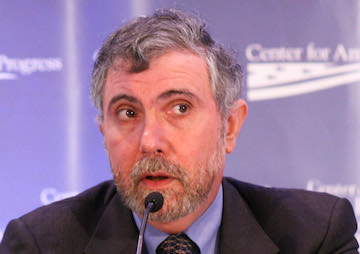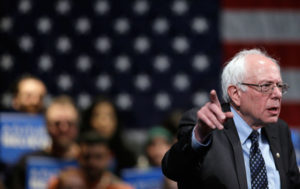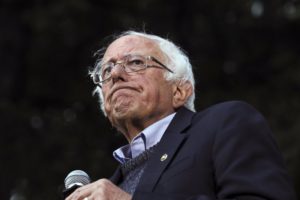Paul Krugman Deems 170 Policy Experts Who Support Sanders’ Wall Street Reforms ‘Un-Serious’
The New York Times columnist burnished his reputation as an irrelevant pundit Wednesday when he judged as "un-serious" 170 economic and financial policy experts who support the Wall Street reforms of Democratic presidential candidate Bernie Sanders, writes Glenn Greenwald at The Intercept. Paul Krugman. (Center for American Progress / CC BY-ND 2.0)
Paul Krugman. (Center for American Progress / CC BY-ND 2.0)
The New York Times columnist Paul Krugman burnished his reputation as an irrelevant pundit Wednesday when he effectively judged as “un-serious” 170 economic and financial policy experts who support the Wall Street reforms of Democratic presidential candidate Bernie Sanders.
The Intercept’s Glenn Greenwald provides the necessary context:
For years, New York Times columnist Paul Krugman has repeatedly complained about the D.C. orthodoxy-enforcing tactic of labeling only those who subscribe to Washington pieties as “Very Serious People,” or “VSPs.” It’s a term Krugman borrowed (with credit) from the liberal blogger Atrios, who first coined it to illustrate how Iraq War opponents were instantly marginalized in establishment discourse and only war advocates were deemed to be Serious. Krugman mockingly uses it so often that the New York Times created a special tag for the term. The primary purpose of the “VSP” tactic is to malign anyone who dissents from D.C. establishment pieties as non-Serious or un-Serious, thus demeaning the person as someone who can (and should) be ignored as residing on the fringe, unworthy of engagement or a real platform regardless of the merits of their position.
On Wednesday, Greenwald continues, Krugman performed “one of the purest and most noxious examples of this tactic,” unironically proclaiming in his column that all “serious” policy experts “lean Hillary”:
Meanwhile, the Sanders skepticism of the wonks continues: Paul Starr lays out the case. As far as I can tell, every serious progressive policy expert on either health care or financial reform who has weighed in on the primary seems to lean Hillary.
Greenwald cites Dean Baker’s reaction to Krugman. Baker is a co-founder and co-director of the progressive Center for Economic and Policy Research whom Krugman has cited as an expert in financial reform and economic policy:
Paul Krugman Revokes Credentials of Those Who Don’t Support Clinton. …
Oh well, so much for those of us backing or leaning towards Sanders. I guess we just have to turn to that old Washington saying, “better right than expert.” In other words, it’s better to rely on people who have a track record of being right than the people who have the best credentials.
With the appropriate sarcasm, Greenwald continues:
As so often happens, those who fancy themselves dissident gate-crashers (which apparently can include someone who is a Nobel Prize-winning tenured economics professor, at Princeton until somewhat recently; an advisory board member of the nation’s largest corporations; and effectively, a life-tenured New York Times columnist) quickly assume the role of vigilantly guarding the gate once they realize they were admitted all along. So congratulations to Paul Krugman on his power of decreeing who is a Serious Expert and announcing that the label applies only to those who want Hillary Clinton [to] be the next president, but not Bernie Sanders.
To any of you Sanders supporters who previously believed that you possessed serious policy expertise, such as Dean Baker; or former Clinton Labor Secretary and Professor of Economic Policy Robert Reich (who yesterday wrote that “Bernie Sanders is the most qualified candidate to create the political system we should have”); or the 170 policy experts who signed a letter endorsing Sanders’ financial reform plan over Clinton’s: sorry, but you must now know that you are not Serious at all. The Very Serious Columnist has spoken. He has a Seriousness Club, and you’re not in it. If you want to be eligible, you need to support the presidential candidate of the Serious establishment, led by Paul Krugman.
Here are the letter and names of the experts who endorse Sanders’ financial proposals:
ECONOMISTS AND FINANCIAL EXPERTS IN FAVOR OF SEN. SANDERS’ WALL ST. REFORMS
In our view, Sen. Bernie Sanders’ plan for comprehensive financial reform is critical for avoiding another “too-big-to-fail” financial crisis. The Senator is correct that the biggest banks must be broken up and that a new 21st Century Glass-Steagall Act, separating investment from commercial banking, must be enacted.
Wall Street’s largest banks are now far bigger than they were before the crisis, and they still have every incentive to take excessive risks. No major Wall Street executive has been indicted for the fraudulent behavior that led up to the 2008 crash, and fines imposed on the banks have been only a fraction of the banks’ potential gains. In addition, the banks and their lobbyists have succeeded in watering down the Dodd-Frank reform legislation, and the financial institutions that pose the greatest risk to our economy have still not devised sufficient “living wills” for winding down their operations in the event of another crisis.
Secretary Hillary Clinton’s more modest proposals do not go far enough. They call for a bit more oversight and a few new charges on shadow banking activity, but they leave intact the titanic financial conglomerates that practice most shadow banking. As a result, her plan does not adequately reduce the serious risks our financial system poses to the American economy and to individual Americans. Given the size and political power of Wall Street, her proposals would only invite more dilution and finagle.
The only way to contain Wall Street’s excesses is with reforms sufficiently bold and public they can’t be watered down. That’s why we support Senator Sanders’s plans for busting up the biggest banks and resurrecting a modernized version of Glass-Steagall.
Signers (Institutional listing for identification purposes only):
1. Robert Reich, University of California Berkeley 2. Robert Hockett, Cornell University 3. James K. Galbraith, University of Texas 4. Dean Baker, Center for Economic and Policy Research 5. Christine Desan, Harvard Law School 6. Jeff Connaughton, Former Chief of Staff, Senator Ted Kaufman 7. William Darity Jr., Duke University 8. Eileen Appelbaum, Center for Economic and Policy Research 9. Brad Miller, Former U.S. Congressman and Senior Fellow, Roosevelt Institute 10. William K. Black, University of Missouri-Kansas City 11. Lawrence Rufrano, Research, Federal Reserve Board, 2005-2015 12. Darrick Hamilton, New School for Social Research 13. Peter Eaton, University of Missouri-Kansas City 14. Eric Hake, Catawba College 15. Geoff Schneider, Bucknell University 16. Dell Champlin, Oregon State University 17. Antoine Godin, Kingston University, London, UK 18. John P. Watkins, Westminster College 19. Mayo C. Toruño, California State University, San Bernardino 20. Charles K. Wilber, Fellow, Joan B. Kroc Institute for International Peace Studies, University of Notre Dame 21. Fadhel Kaboub, Denison University 22. Flavia Dantas, Cortland State University 23. Mitchell Green, Binzgar Institute 24. Bruce Collier, Education Management Information Systems 25. Winston H. Griffith, Bucknell University 26. Zdravka Todorova, Wright State University 27. David Barkin, Universidad Autonoma Metropolitana-Xochimilco 28. Rick Wicks, Göteborg, Sverige (Sweden) & Anchorage, Alaska 29. Philip Arestis, University of Cambridge 30. Amitava Krishna Dutt, University of Notre Dame 31. John F. Henry, Levy Economics Institute 32. James G. Devine, Loyola Marymount University 33. John Davis, Marquette University 34. Gary Mongiovi, St. John’s University 35. Eric Tymoigne, Lewis & Clark College 36. Trevor Roycroft, Ohio University 37. James Sturgeon, University of Missouri-Kansas City 38. Spencer J. Pack, Connecticut College 39. Thomas Kemp, University of Wisconsin – Eau Claire 40. Ronnie Phillips, Colorado State University 41. John Dennis Chasse, SUNY at Brockport 42. Pavlina R. Tcherneva, Bard College 43. Silvio Guaita, Institution, Federal University of Rio de Janeiro (UFRJ 44. Glen Atkinson, University of Nevada 45. William Van Lear, Belmont Abbey College 46. James M. Cypher, Universidad Autónoma de Zacatecas 47. Philip Pilkington, Political Economy Research Group, Kingston University 48. Eric Hoyt, PhD candidate, UMass-Amherst 49. Jon D. Wisman, American University 50. James K. Boyce, University of Massachusetts Amherst 51. Hendrik Van den Berg, Professor Emeritus, Universities of Nebraska 52. Thomas E. Lambert, Northern Kentucky University 53. Michael Nuwer, SUNY Potsdam 54. Nikka Lemons, The University of Texas-Arlington 55. Scott T. Fullwiler, Wartburg College 56. Charles M A. Clark, St. John’s University 57. John T. Harvey, Texas Christian University ?Silvio Guaita, Institution, Federal University of Rio de Janeiro (UFRJ) ?Glen Atkinson, University of Nevada, Reno 58. Daphne Greenwood, University of Colorado-Colorado Springs 59. Gerald Epstein, University of Massachusetts Amherst 60. Mohammad Moeini-Feizabadi, PhD candidate, University of Massachusetts 61. Rebecca Todd Peters, Elon University 62. Andres F. Cantillo, University of Missouri-Kansas City 63. Michael Meeropol, Professor Emeritus of Economics, Western New England University 64. Robert H. Scott III, Monmouth University 65. Timothy A Wunder, Department of Economics University of Texas-Arlington 66. Mariano Torras, Adelphi University 67. Gennaro Zezza, Levy Economics Institute 68. Wolfram Elsner, University of Bremen 69. Larry Allen, Lamar University 70. John Miller, Wheaton College 71. Chris Tilly, UCLA 72. Sean Flaherty, Franklin and Marshall College 73. Clifford Poirot, Shawnee State University 74. Anita Dancs, Western New England University 75. Calvin Mudzingiri, University of the Free State 76. Roger Even Bove, West Chester University 77. Andrea Armeni, Transform Finance 78. Anwar Shaikh, New School for Social Research 79. Steven Pressman, Colorado State University 80. Frank Pasquale, University of Maryland, Carey School of Law 81. John Weeks, SOAS, University of London 82. Matías Vernengo, Bucknell University 83. Thomas Masterson, Levy Economics Institute 84. Antonio Callari, Franklin and Marshall College 85. Avraham Baranes, Rollins College 86. Janet Spitz, the College of Saint Rose 87. Nancy Folbre, University of Massachusetts Amherst 88. Jennifer Taub, Vermont Law School 89. Irene van Staveren, Erasmus University 90. Yavuz Ya?ar, University of Denver 91. Scott McConnell, Eastern Oregon University 92. Don Goldstein, Allegheny College 93. J. Pérez Oya, Retired UN secretariat (Spain) 94. Elaine McCrate, University of Vermont 95. Thomas E. Weisskopf, University of Michigan 96. Jeffrey Zink, Morningside College 97. Scott Jeffrey, Monmouth University 98. Lourdes Benería, Cornell University 99. Frank Thompson, University of Michigan 100. Baban Hasnat, The College at Brockport, State University of New York 101. Ilene Grabel, University of Denver 102. Tara Natarajan, Saint Michael’s College 103. Leanne Ussher, Queens College, City University of New York 104. Kathleen McAfee, San Francisco State University 105. Victoria Chick, University College London 106. Steve Keen, Kingston University 107. Heidi Mandanis Schooner, The Catholic University of America 108. Louis-Philippe Rochon, Laurentian University 109. Jamee K. Moudud, Professor of Economics, Sarah Lawrence College 110. Timothy A. Canova, Shepard Broad College of Law, Nova Southeastern University 111. Karol Gil Vasquez, Nichols College 112. Mark Haggerty, University of Maine 113. Luis Brunstein University of California, Riverside 114. Cathleen Whiting, Willamette University 115. William Waller, Hobart and William Smith Colleges 116. Kade Finnoff, University of Massachuettes-Boston 117. Maarten de Kadt, Independent Economist 118. Timothy Koechlin, Vassar College 119. Ceren Soylu, University of Massachusetts-Amherst 123. David Gold, The New School for Social Research 124. Cyrus Bina, University of Minnesota 125. Mark Paul, University of Massachusetts-Amherst 126. Xuan Pham, Rockhurst University 127. Erik Dean, Portland Community College 128. Arthur E. Wilmarth, Jr., George Washington University Law School 129. Rohan Grey, President, Modern Money Network 130. Tamar Diana Wilson, University of Missouri—St. Louis 131. Radhika Balakrishanan, Rutgers University 132. Alla Semenova, SUNY Potsdam 133. Yeva Nersisyan, Franklin and Marshall College 134. Linwood Tauheed, University of Missouri-Kansas City 135. Michael Perelman, California State University, Chico 136. Janet T. Knoedler, Bucknell University 137. David Laibman, Brooklyn College and Graduate School, City University of New York 138. Ann Pettifor, Director, Policy Research in Macroeconomics, London 139. Steve Schifferes, City University London 140. Al Campbell, University of Utah 141. Faith Stevelman, New York Law School 142. Kathleen C. Engel, Suffolk University Law School 143. Jack Wendland, University of Missouri-Kansas City 144. Ruxandra Pavelchievici, University of Nice Sophia Antipolis 145. Zoe Sherman, Merrimack College ?120. Dorene Isenberg, University of Redlands 121. Barbara Hopkins, Wright State University 122. Matthew Rice, University of Missouri-Kansas City 146. Donald St. Clair, CFP, Financial Planning Assoc. of Northern California 147. Carolyn McClanahan, CFP, Life Planning Partners, Inc. 148. Thomas Ferguson, Senior Fellow, Roosevelt Institute 149. Saule T. Omarova, Cornell University 150. Josh Ryan-Collins, City University, London 151. June Zaccone, Hofstra University 152. Alex Binder, Franklin & Marshall College 153. Albena Azmanova, University of Kent, Brussels School of International Studies 154. Hans G. Ehrbar, University of Utah 155. Devin T. Rafferty, St. Peter’s University 156. Reynold F. Nesiba, Augustana University 157. David Zalewski, Providence College 158. Claudia Chaufan, University of California-San Francisco 159. L. Randall Wray, Levy Economics Institute and Bard College 160. Richard B. Wagner, JD, CFP, WorthLiving LLC 161. Joseph Persky, University of Illinois-Chicago 162. Julie Matthaei, Wellesley College 163. Peter Spiegler, University of Massachuetts-Amherst 164. James Ronald Stanfield, Colorado State University 165. William D. Pitney, CFP, Director of Advocacy, FPA of Silicon Valley 166. Ora R. Citron, CFP, Oak Tree Wealth Management 167. Susan Webber, Former Associate at Goldman, Sachs & Co. 168. Richard D. Wolff, Democracy at Work and New School for Social Research 169. Mu-JeongKho, University College London 170. Kevin Furey, Chemeketa Community College
— Posted by Alexander Reed Kelly.
Your support matters…Independent journalism is under threat and overshadowed by heavily funded mainstream media.
You can help level the playing field. Become a member.
Your tax-deductible contribution keeps us digging beneath the headlines to give you thought-provoking, investigative reporting and analysis that unearths what's really happening- without compromise.
Give today to support our courageous, independent journalists.






You need to be a supporter to comment.
There are currently no responses to this article.
Be the first to respond.